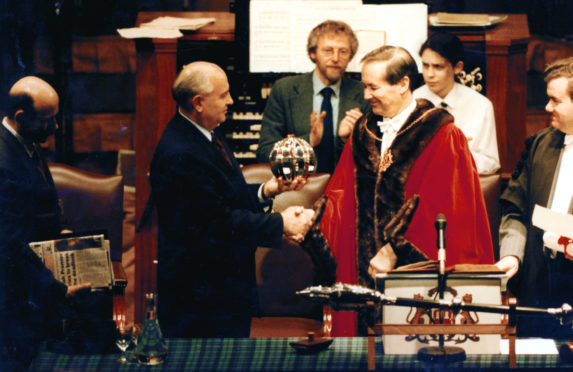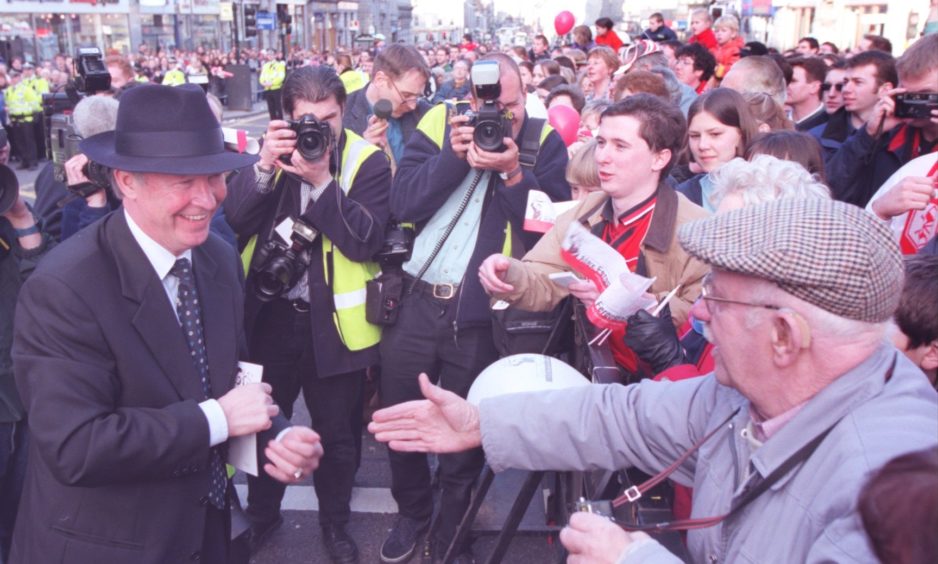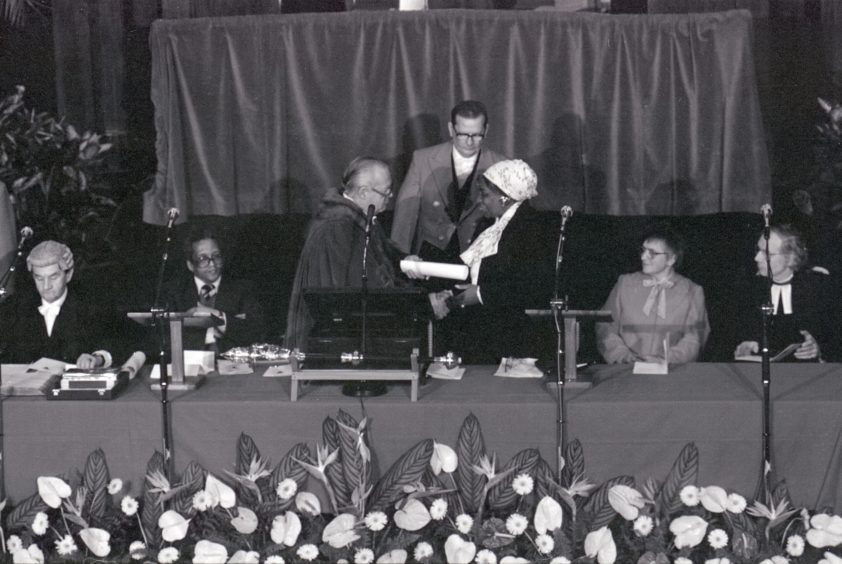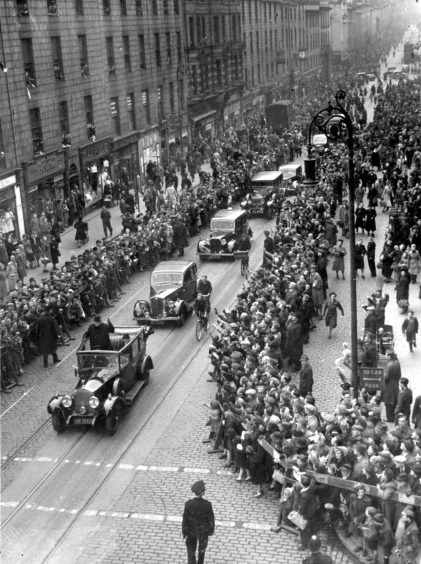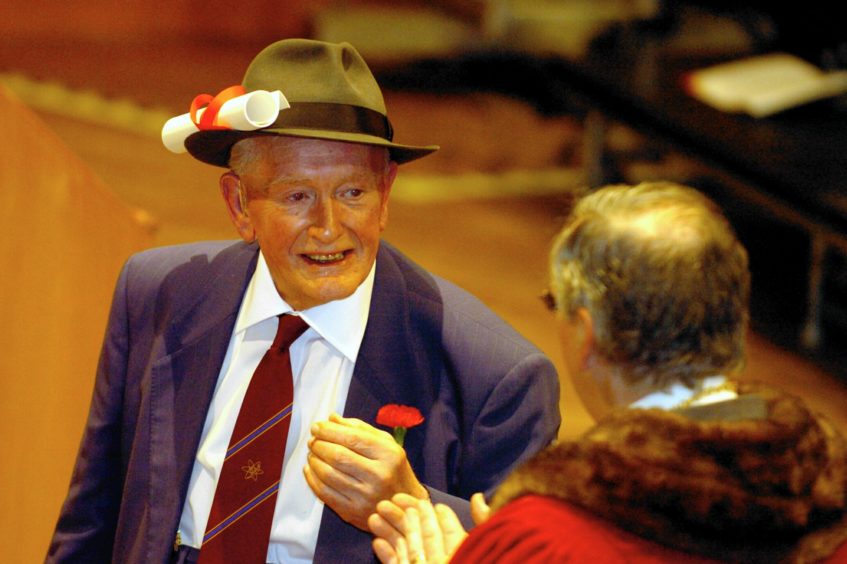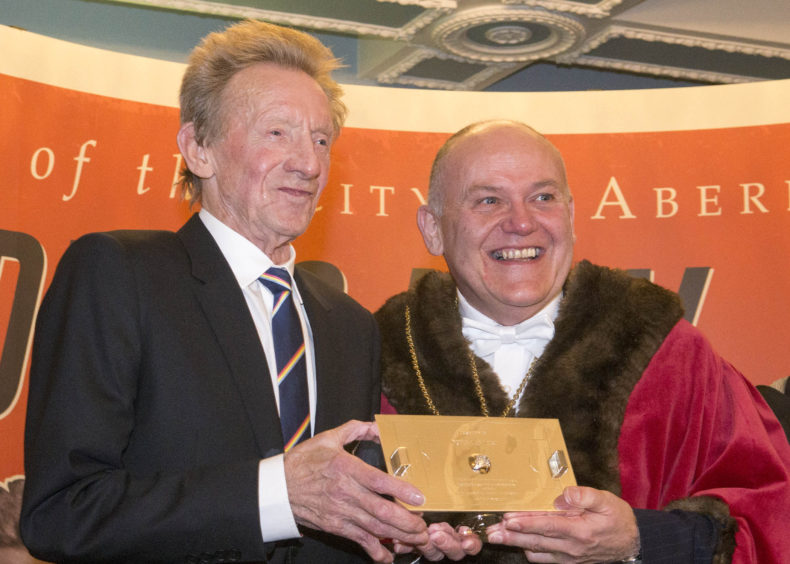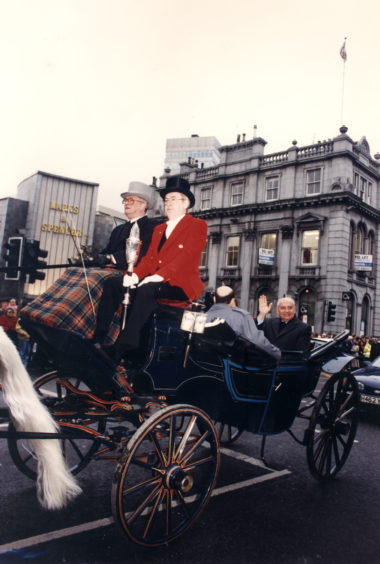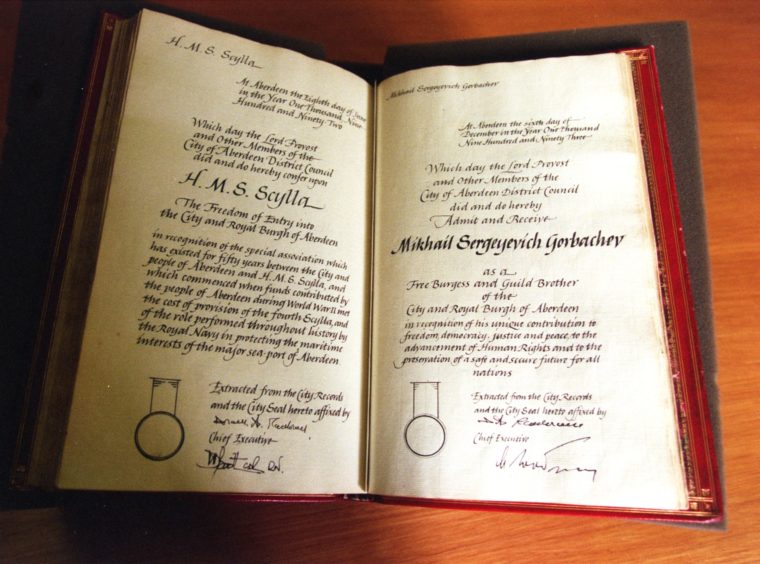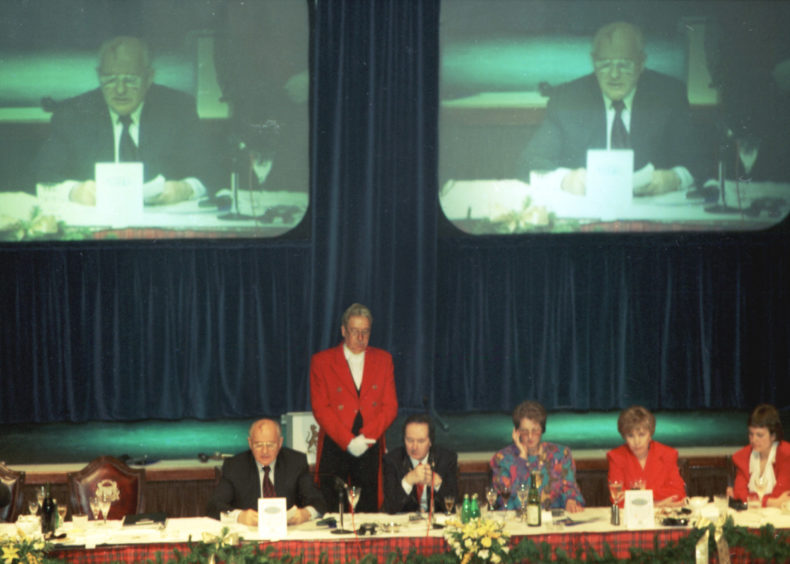When Mikhail Gorbachev was given the Freedom of the City of Aberdeen, he had his cake…but didn’t eat it.
In fact no one did.
Instead the lavish fruitcake, beautifully iced and decorated with the city’s coat of arms for the former Soviet leader – the man who helped end the Cold War – languished forgotten in the back of a town hall cupboard for more than 20 years.
The unusual memento, produced by the city for Gorbachev’s 1993 visit – which grabbed headlines around the world – was found during an inventory of the civic collection, two decades later.
Cake was one of the objects hidden away
Helen Fothergill, head of collections for Aberdeen City Council, was there when the surprising discovery was made in 2014 during a review of the gifts given to the city by visiting dignitaries.
“We found it when we were undertaking an audit of the civic collection, pulling it together as items had been stored in various locations, in cupboards that people had used because there was a major lack of space,” said Miss Fothergill.
“My team went in, scooped up all of the objects hidden away and the cake was one of them.
“We didn’t know about it, but as soon as it was brought out there were a lot of people around who said: ‘Oh I remember that’.”
The cake was just never
cut, so it was kept as a
memento of the event.”
She said the cake was likely supposed to have been served at a reception, but why it wasn’t has been lost in the mists of time.
She said: “The cake was just never cut, so it was kept as a memento of the event.”
There is still an ongoing debate as to exactly what to do with the cake, which is tucked away in storage in the Town House.
Ms Fothergill said: “There is an end-of-life view for cakes.
“But it’s one of the traditional fruit cakes, with marzipan and royal icing on.
“People keep wedding cakes to use as christening cakes and keep them for decades, so it could last a good while.
“But at some point in the future we’ll take a view and say it’s deteriorating and at that point will potential take a full photograph record of it and destroy it.”
Long and illustrious history of the Freedom of the City
Gorbachev’s cake is just a footnote in the long and illustrious history of the Freedom of the City of Aberdeen, an honour that has been bestowed on the great and the good, with its roots going back to the 12th century.
The Freedom was also in the news again recently, with a consultation taking place to see who the next recipient might be, with both NHS Grampian and Prince Charles mentioned in the mix.
Admission as a Free Burgess gives the holder rights and privileges including being exempt from any tolls (hence the freedom).
And Lord Provost Barney Crockett – a keen local historian with an interest in the city’s prestigious Roll of Freedom – said the golden ticket (it was once presented in a gold box) also conferred perks like being able to drive sheep across the Bridge of Dee free of charge.
“But nobody has ever tried to exercise the residual rights,” said Mr Crockett, of a long list of luminaries – such as Prince Albert, Andrew Carnegie, Winston Churchill, Nelson Mandela and Sir Alex Ferguson.
In its modern incarnation, which started in 1834, the Freedom of the City of Aberdeen is bestowed on those deemed to have made an impact either locally or internationally and must be nominated and agreed upon by two-thirds of the council.
Mr Crockett said that has meant not only north-east sons and daughters being honoured, but some heavy-hitters from the global scene.
“Quite interestingly for a city of our scale, we have always had the big picture too,” said Mr Crockett.
“At one point we gave the Freedom of the City to prime ministers of South Africa, Australia, New Zealand and Canada in more or less one go, over a couple of years.”
Mr Crockett reckons Gorbachev’s visit to the city was a major coup.
He said: “That was at the peak of his world role so it was quite something for him to come to Aberdeen.”
And Nelson Mandela’s award – given in 1984 when he was still in jail in South Africa – was a particularly political move.
Mr Crockett said: “That wasn’t a universal one, there was lots of hostility to it.
“Many places were giving Nelson Mandela the freedom of their cities at that time.
“It was part of the protest at his imprisonment.
“Aberdeen thought they would attract some attention and also nominate his wife Winnie, who later got into a lot of trouble.”
Once freed from prison, Mandela went to Glasgow to accept in person all the freedoms he had been granted in his absence – but some Aberdeen councillors refused to go as they wanted Mandela to come to the Granite City in person to collect it.
The Second World War generated a slew of new Burgesses to the city – not least Sir Winston Churchill.
“We offered the Freedom to Winston Churchill in 1946 and he accepted,” said Mr Crockett.
“But Dundee also offered him the Freedom, but he turned it down.”
This was despite Churchill having been the MP for Dundee for 14 years from 1908.
“They kicked him out and he never forgave them for that,” said Mr Crockett.
“The other reason he turned it down was it wasn’t unanimous by the Dundee council but in Aberdeen it was.”
Ambassadors of the allied nations from the conflict were also conferred the Freedom.
Although there is speculation Joseph Stalin was offered, but declined – as did his ambassador.
“That would have brought him too much attention from Stalin,” said Mr Crockett.
Colourful freemen of Aberdeen
Some of the recipients have been hugely colourful characters.
“There was the Earl of Aberdeen who was given the Freedom in 1883,” said Mr Crockett.
“He, amongst many other things, crossed the Wild West of America at the peak of gunslingers and all the rest of it, in the caboose of a train.
“He lost a fortune in ranching in Canada and later on became Governor General of Canada.
“He was also the Lord Lieutenant of Ireland twice.”
Honour bestowed on great philanthropists
Other recipients have been great philanthropists who helped lift Aberdeen.
Andrew Carnegie, for example, gave the bulk of the money to build the city’s Central Library and in 1982, the Scots-born US steel magnate became a Burgess.
He asked that the casket containing his Burgess ticket not be made of “costly material” so was given a humble red leather covered box instead.
At the start of the 20th century two philanthropists were honoured back-to-back, Lord Mount Stephen in 1901 and Lord Strathcona in 1902.
Mr Crockett said: “They were actually cousins.
“These two guys were poor boys from Morayshire who virtually walked to Aberdeen.
“They emigrated to Canada, both made fortunes then competed in who gave away the most.”
Among other things, Lord Strathona helped fund the north-east’s Rowett Institute.
Mr Crockett said: “A staggering thing is that when he got the Freedom, Lord Strachcona paid for a train to come from London with a huge tent, 700 staff and provided 2,000 people with dinner at a marquee next to Marischal College then took the whole lot away again.
“That was his visit to Aberdeen.
“Thank you.”
Of course, we have our home-grown world-beaters in the mix, especially in the field of medicine, such as Professor John Mallard who was honoured in 2004 for his work developing the MRI scanner at the University of Aberdeen.
Mr Crockett said: “There were massive figures, such as Sir Dugald Baird and Lady Baird who were given it jointly in 1966.
“Dugald Baird was a world-leader in obstetrics and gynaecology and women’s rights in health and his wife was a key politican who chaired the equivalent of the health board at that time.
“Aberdeen was seen as the world’s leading health service in that era of the 1950s and 60s.”
Honour for our local heroes
And let’s not forget the local heroes.
The entire Scotland the What? team – Buff Hardie, Stephen Robertson and George Donald – team were given the Freedom in 2008.
And another iconic Aberdeen loon, Denis Law, was the most recent recipient of the Freedom of the City in November 2107 in a weekend-long celebration.
Mr Crockett, who presided over the ceremony as Lord Provost, said: “It was a fantastic and unbeatable atmosphere, partly because he’s such a nice man and an archetypal Aberdonian.
“Quiet, understated but made a fantastic contribution.”
As for who will next receive the Freedom of the City, that’s up for debate.
“There are a lot of potential organisations and individuals who could make claim, and that’s a thing your readers could think about,” said Mr Crockett.
No matter who receives the ancient honour, no doubt there will be cake involved – and hopefully enjoyed this time.
Gorby-mania in the Granite City
The arrival of the man who helped end the Cold War created “Gorby-mania” in the Granite City.
Even up to the night before the ceremony bestowing the freedom on former Soviet leader Mikhail Gorbachev – held in the Music Hall – callers swamped phone lines to the city council clamouring for the 1,000 free places in the now-vanished Capitol Cinema which was screening a live link to the historic event.
And in Charlie’s Bar on Justice Mill Lane, a special Gorby cocktail was created, with vodka, rum, fruit juices and a “secret ingredient”.
The manager, David Colville, had hoped to get Russian costumes for the staff.
A massive transport operation swung into action to, to get 5,000 schoolchildren to Union Street to line the pavements as Gorbachev took part in an official procession from the Music Hall to the Town House.
Every school had been given a special education pack – and it was a big deal for Aberdeen’s Mile End School, which had links with School Number 213 in St Petersburg.
Acting deputy head Pam Michie said at the time: “We have Dima Gavin at the school now, who came from St Petersburg.
“That started out links with the Russian city.
“The children have been designing their own crests to mark the Gorbachev visit.
“The children have got into this in a big way.”
Gorbachev, who gave a peace lecture in the Beach Ballroom on the day of the ceremony, began life as the son of a peasant in the steppes of southern Russia and his first job was operating a combine harvester.
Gorbachev brought freedom
to the ordinary people of
the USSR after centuries
of dictatorship.”
But Gorbachev, born March 2 1931, was set to rise and rise until he became the leader of the second most powerful nation on earth.
That alone would have ensured him a place in history, however, Gorbachev did something else which made him one of the towering figures of the 20th century.
He brought the Cold War between the two superpowers, the US and the USSR, and their various allies, to an end, lifting the threat of a devastating nuclear war from a large part of mankind.
It was an act that earned him the Nobel Peace Prize.
And Gorbachev brought freedom to the ordinary people of the USSR after centuries of dictatorship, starting with the Czars, reaching its zenith with Stalin’s reign of terror before the system stagnated under the cold grip of faceless autocrats.
He broke the chains that had held the Russian people for so long with his now famous policies of glasnost, or openness, and perestroika, or restructuring, words which have found a permanent place in history, like the man who uttered them.
Who do you think should next be given the Freedom of Aberdeen? Get in touch with scott.begbie@ajl.co.uk with your suggestions.
